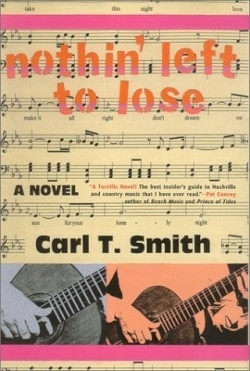Nothin' Left To Lose
Few novels and movies set within the music business ever take a close look at the business itself. There’s a very good reason for this avoidance. Much of the behind-the-scenes action-from grinding out “radio friendly” songs to disposing of surplus records-can be boring. Smith knows, however, that such gray minutiae is the breeding ground of glamour and intrigue.
Nothin’ Left To Lose chronicles the rapid ascent to country music stardom of John Ryan Stone, a maverick even by Nashville’s relaxed standards. Well-educated and a former teacher and Army officer, Stone seems loosely based on Kris Kristofferson (words from whose song, “Me And Bobby McGee,” provide the novel its title). The story unfolds in “Music City” during the late 1960s, when the real Kristofferson still walked its streets and when Bob Dylan and other pop stars were discovering that the town was considerably more than just a nest of musically gifted hillbillies. Complicating Stone’s progress are the financial and cultural turf wars being waged between his record label’s mob-dominated executives in New York and their quick-witted but good-hearted underlings in Nashville.
The battles to own Stone’s music and soul are fought in steamy Southern nightclubs, noisy Philadelphia streets, cluttered Jamaican record stores, remote Tennessee hideaways and the devouring body dumps of New Jersey. The principals in these frays are equally colorful, ranging from sleazy record promoters to hard-partying musicians and stand-by-your man women. It’s a lot of details to weigh, balance and weave together, but Smith is a natural storyteller. He is not, by the way, the Carl Smith who had all those big country hits in the ’50s and ’60s, but it is evident that he has spent enough time in Nashville to develop a feel for the traits, rhythms and folklore of the music industry.
Given the fact that Smith places his story in an era notorious for its social and political turbulence, it is puzzling that he makes so little use of that time for texture and verisimilitude. The escalating war in Vietnam, the ripening Civil Rights and nascent women’s movements, the anarchy on campus and America’s obsession with television merit not a glance in these pages. Except that there are no mentions of digital recording, CDs and music videos, this tale might just as easily have taken place today. Smith also has the peculiar habit of having Stone and his lover refer to each other by their full names when they want to show emotional intensity. But these are quibbles to a book that is by-and-large alluring in its narrative and absorbing in its characterization.
Reviewed by
Edward Morris
Disclosure: This article is not an endorsement, but a review. The publisher of this book provided free copies of the book to have their book reviewed by a professional reviewer. No fee was paid by the publisher for this review. Foreword Reviews only recommends books that we love. Foreword Magazine, Inc. is disclosing this in accordance with the Federal Trade Commission’s 16 CFR, Part 255.

